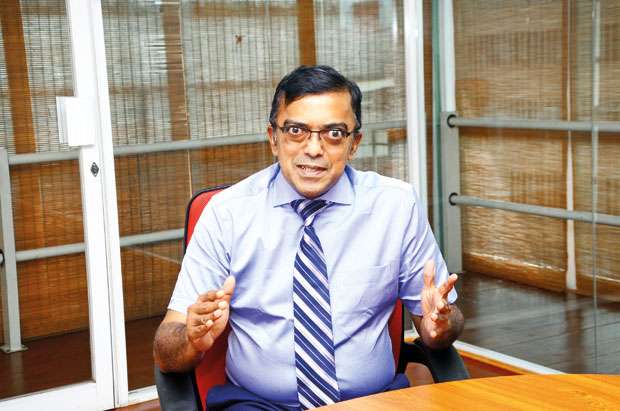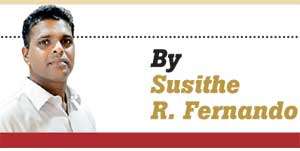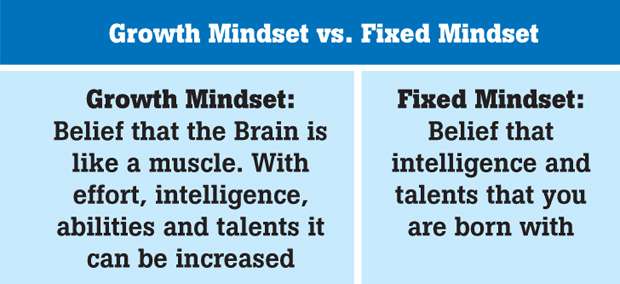02 Jul 2018 - {{hitsCtrl.values.hits}}


A reputed Sri Lankan born mathematician and scientist Prof. Kirthi Premadasa is currently in the country as a United States Fulbright Specialist promoting ‘Growth Mindset’, a novel concept and approach to education. Professor Premadasa a Professor of Mathematics at University of Wisconsin-Platteville, was the recipient of the University of Wisconsin System’s Regents Teaching Excellence Award this year, . This prestigious award, ‘Outstanding UW System Teacher’, was the highest
 teaching recognition in the system that recognizes two faculty members selected from over 3000 faculty members of all 27 universities of the University of Wisconsin System. He has an impressive number of peer-reviewed publications and presentations in Mathematics and College Education and he obtained his PhD from Purdue University USA. A student of Ananda College Colombo, Prof. Premadasa has over 24 years of teaching experience both in the University of Wisconsin System and at the University of Colombo.
teaching recognition in the system that recognizes two faculty members selected from over 3000 faculty members of all 27 universities of the University of Wisconsin System. He has an impressive number of peer-reviewed publications and presentations in Mathematics and College Education and he obtained his PhD from Purdue University USA. A student of Ananda College Colombo, Prof. Premadasa has over 24 years of teaching experience both in the University of Wisconsin System and at the University of Colombo.
Prof. Premadasa who is to conduct a lecture and workshop on the topic ‘Optimizing your potential through a growth mindset’ shared some important points that would be great help to parents, students and those responsible for handling education in the country. Excerpts;
 Q How do you explain the concept of ‘Growth Mindset’?
Q How do you explain the concept of ‘Growth Mindset’?
Let me explain with an example. I studied at Ananda College Colombo and I was not good at arts and it was only once that my drawing was taken to the front of the class. Then I always thought that I was bad at drawing and I hid myself from that. Whenever there was a challenge and somebody asked me to draw something I hid from that.
But recently my young daughter asked me to draw a duck for her and initially I thought I cannot draw but I did not want to tell this to her. I slowly looked at the YouTube and drew a duck and the child was happy.
This experience led me to think about the growth mindset because I know about it. I realised that my mindset was fixed. I thought I am bad at arts so I was avoiding any situation where I had to do that. I was scared that I would come out as an idiot. Now that my daughter wanted me to draw and I had to do it. Next time my daughter came and asked me to draw a dolphin. I did it better because I was careful about my mistakes in drawing. More mistakes I make my brain will create more connections and more electricity. So I followed the concept of ‘Growth Mindset’ to learn a new area. I learnt drawing and I enjoyed doing it. This could be applied to any subject.
Q What are the important areas in learning through Growth Mindset?
Student enjoying the education is the key. But there are well documented research strategies as to how to make somebody a self regulated learner.
Self regulated learning is that we are regulating our learning. How do you create a person like that. This is a problem our Sri Lankan parents are having. How do you make your child enjoy learning.
Following growth mindset will take the pressure away from our parents and children. There are three important things to know if you want to study the growth mindset. The target, the goal and set back. Once you know them there will be an overall mind change.
Almost every school in the United States follows this and there are Growth Mindset programmes.
Q Do you think this can be introduced to Sri Lanka?
Why not. This can be easily introduced to the Sri Lankan school system as well. But you cannot just limit it to schools. It should be to whole parents, teachers, pupils and society. Everybody must embrace this idea or concept. Then only you will achieve the holistic idea of the growth mindset.
Q Instead of taking part in a rat-race this is a concept where you become more humble yourself for learning.
You are right. You are humbling yourself to free yourself. Once you are free from all these bondages, you will enjoy your learning much more. I still have certain amount of fear with regard to my drawing but I know that my drawing has improved.

With regard to mathematics even at this point when someone gives me a math to solve I might get stuck if I started thinking that I have a PhD and I should somehow do it. But once I give up this pressure away, I will get better ideas and even realise that the problem is not at all difficult.
By following this method it will take pressure out of the minds of our parents and children. The most important thing in the growth mindset is you must know what it is.
Q When did you start learning about this?
It was about five years ago. Prof. Carol S. Dweck was the one who started doing research on this. I learnt about it because I teach Math education. I am always looking for the best education methods and best ways of teaching to my students. I won an award for my teaching and to win that kind of an award I must always be current and follow latest pedagogies, the best way to teach my students. I was always exploring this. And I got a grant to read this book on ‘Growth mindset’ with my colleagues and we discussed it elaborately. Then there was another book on Mathematical Mindsets: Unleashing Students’ Potential through Creative Math, Inspiring Messages and Innovative Teaching by Jo Boaler. That also I did another session.
Q As a teacher why do you think teaching with these novel methods is important?
In the United States when we are teaching we want our students to be always better. Because we feel that we can change their lives and when we do that you know what happens. Everybody dies and I will die. I talk like a big guy today but someday in twenty to thirty years I will be lying in a bed and I would not even know the difference between even one and two. When somebody says what is one plus two I would as ‘what’. I would probably have dementia. But if I change my students, they will learn and they will be talking and they will be performing well. So teaching is a unique profession and a teacher is a person who can reach immortality. Teacher can be immortal because when the teacher is dying, the students are living. So I always think in this manner and this is my philosophy. I want to change my students’ lives by actually getting them to learn. I want them to discover their best. This is a good thing for our teachers as well. I know that Sri Lanka also has some teachers like that. But unfortunately our education system caters for exams. I constantly try to improve my teaching so that my students will constantly be better and better learners. By that way I know that I have not spent my life in vain. Most good teachers in the US are like this. They want their students be enlightened learners. Not just study for an exam.
"I can try introducing this to Sri Lanka and I think it can be done. This is a system where your whole way of thinking is changed. Now if this is done by the Education Ministry you have to invest on this"
Q Passing Mathematics specially at the GCE Ordinary Level is a massive hurdle for students in Sri Lanka. The Ordinary level mathematics paper decides the entire life. As a mathematician how do you describe this situation?
Growth mindset can be applied to mathematics as well. Maths is a subject that everybody can do. You just have to work hard. There is no alternative for working hard. When I was at Ananda College, in one exam I got 27 out of 100 for my mathematics paper. Teacher called my mother (who was also a teacher) to the school and the my class teacher was my mother’s student. My teacher made a big fuss about my marks. But I later found a maths teacher who changed my life and then I started getting ‘A’s and a first class in mathematics and I went on to earn a PhD in mathematics. But students must not think that this will come easily. The fact that you don’t get mathematics easily does not mean that you are not good at mathematics.
This can be applied to growth mindset. You have to put into work. That is the advice I am giving to young people. All the mathematics that you do at the Ordinary Level can be mastered. You don’t have to have a superior brain. Some of them might have to work a little bit more. So go for the effort and there is no short cut to hard work. Through hard work you can achieve.
Anyway I don’t want to question on this system because I am also someone who went through this system and entered university. I cannot say this not important. There are many who went to the university through this hard system and now doing well. While you are getting the grades it is important about the process of learning as well. That is doing what you like to do. Let your brain to embrace mistakes. And learn through the mistakes. Get out of the target of becoming a genius. Albert Einstein had to work very hard. He once said if you think your mistakes are big, mine are bigger.
Even if you take religion and religious leaders they worked very hard. If you take the Buddha he worked very hard. What I want to tell the ordinary level students is to think about trying and trying. More than the grades in the exam ,try to take a new challenge.
Q What is the response of the world to ‘Growth mindset’?
As a matter of fact Stanford University and certain universities in the US are changing their admission. Now at the Stanford University, eight percent are apparently reserved not for grades but for the ability to take challenges. Now studies have found that when a child is between one year to five years the phrase that “you are intelligent and smart and clever and brainy” will affect him or her whether that person is ready to take a challenge or not. From the small age if you allow the child to take up the challenge it would be good. The Miscrosoft CEO has constructed that, more than the grades what is important is ‘tenacity’ and the ability to take challenges. What is more important is tenacity. This is very hot now. Australia, the Britain and the US where it started at the Stanford it is popular.
Q if you are invited to introduce Growth Mindset to our educators and the education system are you ready to help?
This time I came here as a Fulbright scholar and then I was invited to share with whatever I could with Sri Lanka and organised some sessions. But if I am doing it comprehensively I will have to study what is happening in India and other Asian countries, and the best way to develop it. But to be honest I have only studied the researches done in the US and I know some researches done in Australia and then I did some research in England. It is happening all over the world.
I can try introducing this to Sri Lanka and I think it can be done. This is a system where your whole way of thinking is changed. Now if this is done by the Education Ministry you have to invest on this. This does not limit to just giving a lecture to teachers. That should be given to every strata of the society, that is The teachers, parents, professionals and students. It should be over all. Even in the job opportunities this has to be there because the child who learnsww with growth mindset will go to a job one day. You cant introduce part by part. Even the Fulbright Commission told me that it is a need. Had I know this is a need I would have come for this. I would have easily done some workshops.
|
Prof. Premadasa, an outstanding educator
Selecting Prof. Premadasa as one of the recipients of the award, Regent Janice Mueller, chair of the selection committee has stated “These outstanding educators inspire students and fellow teachers alike with their innovative approaches to teaching and learning”. “We are pleased to recognize their dedication to student success, demonstrating how learning can change lives,” he added. Prof. Premadasa was selected for his strong commitment to teaching and learning; use of effective teaching strategies to enhance student learning; and significant impact on students’ intellectual development. In selecting Prof. Premadasa, Associate Professor, Mathematics Department, UW-Baraboo/Sauk County, UW Colleges, as a recipient of this year’s award it was stated , “as a mathematician and scientist, he implements his teaching philosophy in class through a wide range of research-guided interventions. For example, to address student difficulty understanding integration applications, his review of existing research revealed the underlying cause to be students’ inability to visualize an integral as an accumulation. He and his colleagues developed a special lesson to help students, which Premadasa published in a peer-reviewed international journal. He engages students with deep learning and robust peer discussion; creates relevance with realistic word problems; organizes effective professional development for teachers; and facilitates optimal curricular change. He worked with the department chair to design a new pathway for students taking developmental mathematics to increase the odds they would go on to pass college algebra. The program is now in its third year with positive results. Premadasa also designed and taught a projectbased business algebra course using UW-Extension’s competency-based model. He has mentored four undergraduate research projects, two of which have gone on to be published. In last December, he was named a U.S. Fulbright Specialist in Mathematics Education for a three-year term. |
|
Growth Mindset- Research every teacher should know
There is a wealth of psychology research that can help teachers to improve how they work with students, but academic studies of this kind aren’t always easy to access or translate into the realities of classroom practice. This series seeks to redress that by taking a selection of studies and making sense of the important information for teachers, as we all seek to answer the question: how can we help our students do better at school? This time, we consider growth mindset. Growth mindset – the idea that intelligence can be developed rather than it being set in stone – is arguably the most popular psychological theory in education at the moment. It was launched into mainstream consciousness after a seminal growth mindset study almost 20 years ago and has since spawned many assemblies and form tutor-time activities.
COURTESY THE GUARDIAN |
14 Jan 2025 29 minute ago
14 Jan 2025 34 minute ago
14 Jan 2025 2 hours ago
13 Jan 2025 13 Jan 2025
13 Jan 2025 13 Jan 2025